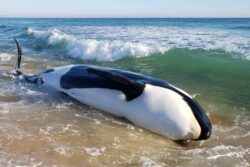An orca beached itself near Palm Coast, Florida on Wednesday (Picture: AP)
A killer whale died in Florida after beaching itself on the state’s Atlantic coast.
The Flagler County Sheriff’s Office responded to reports of a beached orca on Wednesday morning near Jungle Hut Park in Palm Coast, Florida. The location was about 60 miles south of Jacksonville.
They arrived to find the majestic black-and-white whale close to death with no obvious signs of physical trauma. The cetacean measured about 21 feet in length.
The sheriff’s office reported the orca died by 9am. They called in experts from the Florida Fish and Wildlife Commission and the Hubbs-SeaWorld Research Institute to help remove the whale and perform a necropsy.
Crews from Hubbs-SeaWorld Research Institute and the Florida Fish and Wildlife Commission help remove the orca from the beach (Picture: Flagler County Sheriffs Office)
The crews transport the orca to a facility in order to perform a necropsy (Picture: Flagler County Sheriffs Office)
Meanwhile, a large crowd began to gather to view the rare sight. So many people stopped by the beachfront park that officials were forced to close roads leading to the orca’s location.
By 4pm, the whale was removed from the beach and the road was reopened.
According to experts at the National Oceanic and Atmospheric Administration (NOAA), this is the first time an orca has ever beached itself in the American southeast.
‘We really don’t know much about them, and in U.S. waters, they’re characterized as uncommon or rare,’ Erin Fougeres told the Daytona Beach News-Journal. Fougeres leads NOAA’s marine mammal stranding program for the southeast region.
Experts currently do not know why the orca beached itself (Picture: Flagler County Sheriffs Office)
About 50,000 orcas live in all of the world’s oceans, according to NOAA. In the North America, the most studied population resides in the northeast Pacific Ocean, where about 2,500 whales make their home off the coasts of Washington, British Columbia, and Alaska.
There are about 14,000 orcas in the North Atlantic, but their population in near the southeast numbers only in the hundreds. Scientists know very little about this population.
Fougeres said that her team was hoping to discover why the whale had beached itself. ‘We’ll be doing a full investigation into what might have caused this animal to strand, or if it’s sick, what might have caused that,’ she said. ‘We’re eager to learn as much as we can about this whale and about the species.’
Got a story? Get in touch with our news team by emailing us at [email protected]. Or you can submit your videos and pictures here.
For more stories like this, check our news page.
Follow Metro.co.uk on Twitter and Facebook for the latest news updates. You can now also get Metro.co.uk articles sent straight to your device. Sign up for our daily push alerts here.
The majestic black-and-white whale measured about 21 feet.





